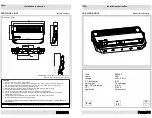
CHARGING THE PC/BISLW.
3-9-2. Charging the 12-Volt/24-Volt Vehicle Battery.
Always disconnect torch and striker plate power cables prior to charging the battery.
Working in vicinity of a lead-acid battery is dangerous. Batteries generate explosive gases during
normal battery operation and there is a risk of these gases exploding. Never smoke or allow a spark
or flame in the immediate vicinity of the battery to reduce the risk of battery explosion.
a. Read and carefully follow the manufacturer's instructions for charging the vehicle battery(ies) being
used.
3-10. TRANSFILLING OXYGEN CYLINDERS.
a. General.
Only personnel with the proper training and knowledge of safe oxygen handling should
attempt to fill a high pressure oxygen cylinder. Do not attempt to fill or transfill an oxygen cylinder
unless trained in cylinder handling, cylinder filling and oxygen safety procedures.
Never let sparks or molten material come into contact with the oxygen cylinder.
Always keep oil and grease away from the torch, oxygen cylinders, valves, regulators, hoses, and
fittings. Oxygen reacts explosively when mixed with oil or grease.
Never clean any internal part of the oxygen system. Never use compressed air, oil, solvents, or any
other material to clean the oxygen system. The oxygen system could become contaminated and
cause internal burning in the torch or hose. All service on oxygen delivery parts must be performed
by a qualified and knowledgeable technician.
Always ensure the cylinder to be used is marked with a sticker showing a valid inspection
certification. High pressure gas cylinders are required to comply with current inspection and testing
requirements. Cylinders must undergo internal visual inspection annually and pass hydrostatic
testing every three years.
Prime-Cut Tactical torch kits utilize a fiber wound composite oxygen cylinder. Never use a cylinder
with damaged windings. Always have a licensed test facility inspect questionable cylinders.
Always open the oxygen cylinder valve slowly. Do not allow rapid pressurization of regulators,
hoses or cylinders. Failure may occur, injuring the operator or bystanders.
WARNING
WARNING
















































